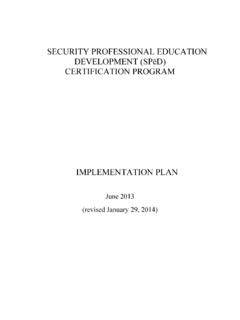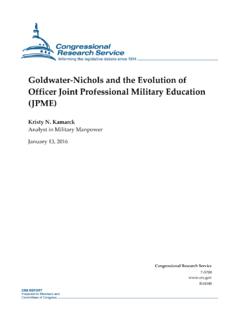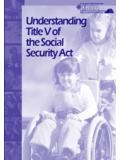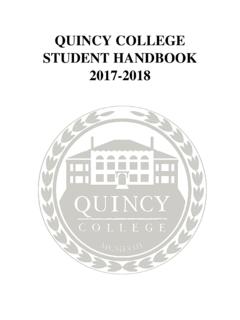Transcription of Organizational Culture in Social Work Professional ...
1 Organizational Culture in Social work Professional education : A Case Evaluation Journal: Professional development : The International Journal of Continuing Social work education Article Title: Organizational Culture in Social work Professional education : A Case Evaluation Author(s): Susan Mason and Heidi Heft LaPorte Volume and Issue Number: Vol. 11 No. 1 Manuscript ID: 111019 Page Number: 19 Year: 2008 Professional development : The International Journal of Continuing Social work education is a refereed journal concerned with publishing scholarly and relevant articles on continuing education , Professional development , and training in the field of Social welfare. The aims of the journal are to advance the science of Professional development and continuing Social work education , to foster understanding among educators, practitioners, and researchers, and to promote discussion that represents a broad spectrum of interests in the field.
2 The opinions expressed in this journal are solely those of the contributors and do not necessarily reflect the policy positions of The University of Texas at Austin s School of Social work or its Center for Social work Research. Professional development : The International Journal of Continuing Social work education is published three times a year (Spring, Summer, and Winter) by the Center for Social work Research at 1 University Station, D3500 Austin, TX 78712. Journal subscriptions are $110. Our website at contains additional information regarding submission of publications and subscriptions. Copyright by The University of Texas at Austin s School of Social work s Center for Social work Research. All rights reserved. Printed in the ISSN: 1097-4911 URL: Email: Organizational Culture in Social work Professional education : A Case Evaluation Susan E.
3 Mason, PhD and Heidi Heft LaPorte, DSW The call for further professionalization of the child welfare workforce has led a number of states to endorse and subsidize Social work educa-tion for its child welfare workers (Jones & Oka-mura, 2000; Steib & Blome 2004). In these pro-grams, full-time employees of child welfare agen-cies are required to accept student internships at Social service agencies as part of Social work edu-cation. In their roles as students, they face the challenge of adjusting to the norms and expecta-tions of the internship site that may differ from the Organizational Culture of their child welfare agencies. This article focuses on the field work experiences of full-time child welfare employees assigned for masters-level Social work education fieldwork at a hospital-based children s sex-abuse clinic.
4 The theoretical of perspective of organiza-tional Culture provides the framework that guides the analysis of the dynamics of the students, host staff, and other key players. Organizational cul-ture is defined here as the deeply embedded pat-terns of Organizational behavior and the shared values, assumptions and beliefs, or ideologies that members have about their organization or its work (Peterson & Spencer, 1991, p. 142). Or-ganizational Culture is operationalized by review-ing the verbal reports and the observed behavior of participants from the four groups involved in the field education site: the students, the host agency staff, the supervisors from the public child welfare agency assigned to monitor the students progress, and the field education advisors from the schools. The working theme of this study is that each group came to the field education site with a set of values and expectations grounded in their experiences of their respective organiza-tions.
5 These values and expectations sometimes brought about conflicts among the groups. These conflicts were resolved with the help of the pro-ject evaluation team. The goal of the project evaluation team was to identify ways to improve masters-level Social work field education for full-time child welfare workers. The importance of Organizational Culture as an explanatory phenomenon emerged from the data collected for the project from students and staff from three organizations: 1) the child protection center (CPC) as the host agency for the student interns, 2) five schools of Social work (SSW) con-sidered for this discussion as one, , the schools, and 3) the employing agency of the stu-dents, a large, public, child-welfare organization (PCW). The host site, the child protection center (CPC), is a combination forensic investigative center and counseling program for at-risk fami-lies.
6 It is located in a densely populated area of a large city. The student interns at the child protec-tion center (CPC) were full-time employees of the city s public child welfare agency (PCW) granted paid educational leave to pursue their masters degree in Social work . The agency s (PCW) ex-pectation was that the students would take foren-sic interviewing and counseling skills back with them when they returned to agency work . To help achieve this goal the PCW assigned supervisors to monitor the students work and troubleshoot for problems. The schools of Social work typically assigned field advisors to the site whose responsibilities were to assure the quality of the field education for their students and to serve as liaison between the school and the host agency. As is usual, the host agency (CPC) assigned a field instructor to each student to guide the learning process and help students negotiate the expectations of the site.
7 The unique aspect of this arrangement was a grant provided by the state s schools of Social work consortium to fund a half-time field educa-tion coordinator who served as an on-site educa-tor and advisor for the students. Funding for this position was called for by the schools and the PCW because both groups regarded this field education setting as a model program for training future child welfare employees in skills related to both child welfare and generic Social work . The 19 Susan E. Mason, PhD is Professor of Social work and Social Welfare at Yeshiva University and a Senior education Specialists for the New York State Social work education Consortium. Heidi Heft LaPorte, DSW is Associate Professor of Social work and Social Welfare at Yeshiva University and a Senior education Specialists for the New York State Social work education Consortium.
8 Schools and the PCW had maintained a good working relationship through the consortium for the past several years and the host agency (CPC) was added for this project. Internships require a certain amount of adjust-ment and navigation that students must make to be successful at field education sites. For the child welfare worker students the work of the host agency was closely related to that of the PCW, where they were viewed as better-than-average employees. However, their student status at the CPC demanded that initially they see themselves as learners rather than as experts. It was likely easier for these students to take the learner role in the classroom setting than in a child protection center where there were familiar tasks. The goal of the evaluation study was to focus on the stu-dents educational outcome, but as the data were reviewed the importance of Organizational Culture emerged as the most important aspect of the ex-perience for participants from all three institu-tions.
9 In this way two questions guided both the evaluation and this article: 1) How did differences in Organizational Culture affect the educational experience? 2) to what extent were the partici-pating organizations able to learn from the experi-ences of the first year to make improvements? The importance of giving public child welfare workers the best possible Social work field educa-tion experience was the driving force behind the project. An Overview Child welfare agencies have utilized the fund-ing from Title IV-E of the Social Security Act to create education -incentive programs to make their work force both more Professional and more sta-ble. (Mor Barak, Nissly, & Levin, 2001; Rose, 1999; Scannapieco, Bolen, & Connell, 2000). Employing agencies have offered to subsidize workers education and in return ask for a com-mitment of continued employment.
10 This arrange-ment requires collaboration between the employ-ing agency and the departments and schools of Social work . The fieldwork sites have not re-ceived much attention by the employing agencies largely because they are viewed as being part of the educational program and, therefore, the re-sponsibility of the schools. When the employing agency is large, students may do their fieldwork in that part of the agency where they do not work as employees. When the student s fieldwork is outside of the employing agency, at least three organizations are involved: the employing agency, the fieldwork site, and the Social work school. White there is currently no way of know-ing how many three-way arrangements exist na-tionally, it is fair to speculate that as the cost of Social work education rises, workers will more often look to employers to fund their graduate studies.






